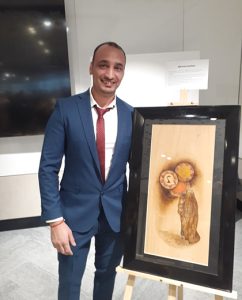Four years on, refugee families thriving, survey finds
Refugee families from the Syria-Iraq and Afghanistan conflicts have achieved significant settlement, employment and social outcomes four to five years after arriving Australia, new research has found.
A focus group survey of 35 families from Syria, Iraq and Afghanistan, commissioned by refugee and migrant settlement agency AMES Australia, found overwhelmingly positive responses to questions about satisfaction with life in Australia, employment and social circumstances as well as the factors needed to build successful lives.
In 2017 and 2018 large numbers of refugees from Syria, Iraq and Afghanistan arrived in Australia.
A group of 35 refugee families from this cohort were asked about levels of satisfaction, reasons for success, barriers to social and economic participation as well as fears and concerns over the four to five years since their arrival.
The results of the survey contrast with previous research that looked at settlement outcomes after two years, and which found less than optimum outcomes.
 Overwhelmingly, the families interviewed were happy with their lives in Australia with 87 per cent saying they were ‘very satisfied’ and another ten per cent saying they were ‘mostly satisfied’.
Overwhelmingly, the families interviewed were happy with their lives in Australia with 87 per cent saying they were ‘very satisfied’ and another ten per cent saying they were ‘mostly satisfied’.
Seventy per cent of participants said they had achieved their work or professional ambitions and 26 per cent said they had been ‘partly’ achieved.
Asked about how long it took to get a first job in Australia, 34 per cent said ‘up to six months’, 48 per cent said ‘six months to a year’ and 10 per cent said ‘ up two years’.
Access to work experience was identified by most respondents as the thing that most helped them get a job (32 per cent) while 21 per cent cited ‘having a qualification recognised’, 16 per cent said ‘learning about the Australian job market’ and 15 per cent said ‘English language proficiency’ was most important.
Overwhelmingly, the refugee families felt welcome in their new home.
Eighty-one per cent of families said they felt ‘very welcome’ in Australia and 19 per cent said they felt ‘mostly welcome’.
‘Having a job’ (51 per cent) and ‘English proficiency’ (31 per cent) were cited as the main factors contributing to successful settlement while ‘language barriers’ (13 per cent) and ‘having family overseas’ (11 per cent) were identified as the main barriers.
Seventy-eight per cent of respondent families said their expectations of life in Australia had been met, while 22 per cent said they had been ‘partly met’.
In order, ‘safety and security’ (38 per cent), ‘work/career opportunities’ (22 per cent), ‘education’ (11 per cent), ‘lifestyle’ (11 per cent) and ‘healthcare’ (9 per cent) were cited as the best things about Australia while ‘cost of living’ (62 per cent) and ‘missing family and friends’ (23 per cent) were identified as the worst.
The refugee families interviewed in the survey overwhelmingly felt welcome in Australia.
Seventy-three per cent said they found government and official institutions welcoming and 81 per cent said they found Australian people welcoming.
Asked about their main goals over the next five years, 36 per cent of the families cited ‘buying a house’, 21 per cent cited ‘securing my family’s future’, 19 per cent said ‘get a better job ten per cent said ‘start a business’.
Asked about their main goals over 20 years, 43 per cent said ‘seeing my children educated’, 29 per cent said ‘running a successful business’ and 14 per cent answered ‘owning a home’.
The ‘cost of living’ (51 per cent) and ‘bringing family to Australia’ (19 per cent) were identified as the groups biggest worried, ahead of housing and health concerns.
‘Learning English’ (42 per cent) and ‘getting a job’ (37 per cent) were the top answers to a question about what advice they would give to people arriving in Australia ahead of ‘engage with the Australian community’ (11 per cent) and enrol in ‘education and training’ (9 per cent).
Young people among the group were even more upbeat about life in Australia.
Of people aged under-18 among the families, 89 per cent were ‘very satisfied’ with life in Australia and 11 per cent were ‘mostly satisfied’ while 91 per cent were ‘very optimistic’ about the future and nine per cent were ‘mostly optimistic’.
Fifty-four per cent of young respondents cited ‘educational opportunities’ as the best thing about Australia, 19 per cent cited safety and freedom, 16 per cent said it was employment prospects and 11 per cent leisure activities.
AMES Australia CEO Cath Scarth said the survey results spoke to the resilience, ambition and optimism of refugees.
“It shows that refugees bring with them significant resourcefulness and ambition and despite the trauma or loss may have suffered, they are determined to build – and are building – new lives in Australia,” Ms Scarth said.
Survey participant and Afghan refugee Mirwais Janbaz, who arrived in Australia in 2018 after spending 20 years living in limbo in Pakistan says coming to Australia was “a golden opportunity”.
“In Pakistan there was really no hope for the future. We were not allowed to study or work and we could not even have a bank account,” Mr Janbaz said.
“Here is Australia, I have a job, my family is building a house and I am looking forward to the future. I am grateful to be in Australia and to finally have an identity and a place to call home,” he said.












